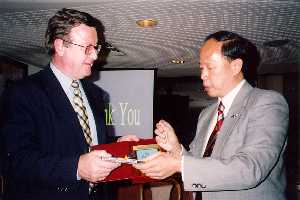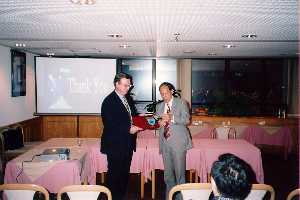

AGM special guest Mr. Benny Ng, Commissioner of Correctional Services presents the President of the Hong Kong Criminology Society, His Honour Justice Tom Gall with a commemorative plaque and CD.
Minutes: Meeting Commenced at 6.05 PM: Special Guest, Mr. Benny Ng, Commissioner for Correctional Service HKSAR.
1. President's Address
His Honour Thomas Justice Gall, welcomed all members to the AGM and thanked the Chair and Executive Committee for their work over the year. The President noted the history of the Society extending back to the early 1970s and the role of Dr. Robert Andry and other founding members. The revival of the Society over the last few years had given the Society a welcome new lease of life and a good basis for the future. The recent collaboration with the Medico-Legal Society and the Centre for Criminology helped promote the Society's aims and a were a positive initiative. He stressed the importance of building up the membership and encouraged members to promote the Society.
2. Chairman's Report
The Chairman Dr. Harold Traver outlined the programme of events conducted in the past 12 months and advised of forthcoming speakers and symposia. A guest lecture by Professor John Pratt University of Victoria, Wellington NZ, would be held on the 29.6.2000 and a symposia, on the subject of punishment and dangerousness and a symposia held co-jointly with the Forensic Pathology Service on the Coroner's Court was scheduled for June 12th. A delegation of criminologists from Taiwan and the USA was also scheduled to visit as guests of the Society on July 31 and a symposium would be arranged on the theme of crime in greater China.
In the past year, particularly well supported were talks on cyber-crime, forensic issues, and the symposia held on human smuggling crime and the elderly. Joint presentations with the Centre of Criminology and the Medico-Legal Society were well received and would continue in the future. The relationship between the Society and the Centre for Criminology would be a matter for the executive to consider more fully in the coming months.
Members were informed of the Society's website located at <www.hku.hk/crime> and that relevant talks or papers were often posted for future reference. The Chair thanked the executive and the Honorary Clerk Mr. Lau Wing Yat for their support during the year. The Chair invited members to feel free to suggest topics or speakers for Society presentations and to contact the secretary or anyone on the executive to arrange inclusion in the programme.
3. Treasurer's Report
Mr. Bill Marshall advised that the Society held $9,889.46 in its HSBC account. Income from subscriptions was not quite sufficient to balance the budget. Including the costs of holding the AGM expenditure was slightly more than income received this year.
4. Secretary's Report
Dr. Roderic Broadhurst informed the AGM that the membership list was now 138 persons of whom 31 were actually currently paid up and that subscription notices would be sent out in May reminding members that subscriptions were due.
4.1 Membership Fees
The secretary spoke of the need for membership fees to be raised in
order to cover the costs of the Society and to build a reserve that
would enable the Society to provide a more varied programme. Both the President
and the Treasurer spoke in favour of the need to increase subscriptions
and after discussion on the floor a motion to raise subscriptions
effective from June 1 was moved by the Chair and seconded by Dr. Hamilton
and Dr. Beh. The motion was carried by a show of hands and it was agreed
that the membership subscriptions would be set, effective June 1, as follows:
| Ordinary members | $250.00 per annum |
| Student members | $100.00 per annum |
| Corporate members | $5,000.00 per annum |
4.2 Nominations for Office Bearers and Executive Committee Members
The Secretary advised that nominations for vacancies on the Executive were open and that the following had agreed to serve for a further year:
Dr. Harold Traver, Professor KC Wong, Dr. Karen Joe-Laidler, Mr. Bill Marshall SC, Dr. Roderic Broadhurst, Dr. Philip Beh, Dr. Chu Yui Kong, Mr. Simon Chong, Mr. David Hodson, Mr. Tim McNally, Mrs Elsie Wong, Mr. Samson Chan, Dr. Sheilah Hamilton and Mr. Stanton Lau.
The President put the nominations to the AGM and they were endorsed unanimously. The President thanked both new and old members of the executive for volunteering their time and service.
5. Membership and Newsletter sub-committees
These matters were referred to the new committee for action at the next executive committee to be held in June [date to be announced].
6. Other Business
A member raised the issue of double mailings and the cost this entailed. It was explained that this had arisen because the Centre for Criminology which carried out administrative tasks for the Society also recently administered the notices for the Medico-legal Society.
Special Address to the AGM
The meeting closed at 6.30 PM and the President introduced the special guest Mr. Benny Ng. Mr. Ng gave an interesting presentation on the work of the Correctional Services Department and a lively Q& A followed. The President was delighted to receive on behalf of the Society from Mr. Ng a commemorative plaque and CD-rom. The talk was reported in the SCMP on 4.5.2000 under the title "Sex swap for prisons looms amid rising number of female inmates" by Ms. Stella Lee.


AGM special guest Mr. Benny Ng, Commissioner of Correctional Services
presents the President of the Hong Kong Criminology Society, His Honour
Justice Tom Gall with a commemorative plaque and CD.
Please note in your diaries the following forthcoming events:
June 13: DEATH INVESTIGATIONS AND THE CORONER'S COURT: Tuesday 5:30p.m. - 7:30 p.m. Venue: 15/F, Senior Common Room, K.K. Leung Bldg., The University of Hong Kong. Panel: Mr. Andrew CHAN, Coroner. Professor Jeff JENTZEN Milwaukee County Medical Examiner's Office and Dr. Philip S.L. Beh, Department of Pathology, HKU. Sponsored by the Society and co-jointly presented by the Centre for Criminology and the Forensic Pathology Service, Health Department.
June 29: DANGEROUSNESS, PENALTY AND PUBLIC POLICY: Professor John Pratt, Institue of Criminology, Victoria University, Wellington, New Zealand. Thursday, June 29, 2000 Time: 6:30 - 7:30 p.m. Venue: Senior Common Room, 15/F, K.K. Leung Building, The University of Hong Kong.
"Sex swap for prisons looms amid rising number of female inmates" by line STELLA LEE SCMP 4.5.2000
Men's prisons will be turned into women's jails if the number of female inmates continues to rise, prison chiefs have revealed. Commissioner of Correctional Services Benny Ng Ching-kwok said last night the number of female prisoners had risen in recent years, and one in five inmates were now women. "Male prisons will be turned into female ones if the population of women inmates rises to a certain level. This is one of the contingency plans we have prepared," Mr Ng said. He did not give further details of the plans.
The prison chief said his department was also working to improve rehabilitation programmes for illegal immigrants, who accounted for 24 per cent of the prison population. "We want to make sure we have programmes in place which will enable them to be reintegrated into their society on the mainland rather than Hong Kong," Mr Ng said.
The former senior assistant police commissioner, who has just completed his first year of service with the Correctional Services Department, said overcrowding would remain a problem, and that overcrowding rates were projected to increase from the present 104 per cent to 116 per cent by 2003.
Mr Ng said the idea of building a "super-jail" to hold all 11,000 inmates under the same roof, reported by the South China Morning Post in February, was still under consideration and could not be confirmed yet. The "super-jail" idea is one of several options being considered by the Government to improve the prison system.
Addressing Hong Kong University's Society of Criminology's annual general meeting last night, Mr Ng also presented the findings of the department's latest prisoner re-admission survey, which found that 52.6 per cent of inmates discharged in 1995 were back in jail within three years. A breakdown on the figures for 1995 found that drug addicts had the highest re-admission rate, at 61.2 per cent. Adult prisoners as a whole had a re-admission rate of 52.1 per cent.
Mr Ng also revealed that the department had considered
privatising some correctional services institutions, as had been done in
some other countries, but he said it had ruled out the option for the moment
as it believed that direct supervision of inmates offered the best hope
for rehabilitation. "One of the many problems that has been encountered
with privatisationis the ability to ensure the maintenance of quality of
service," he said.